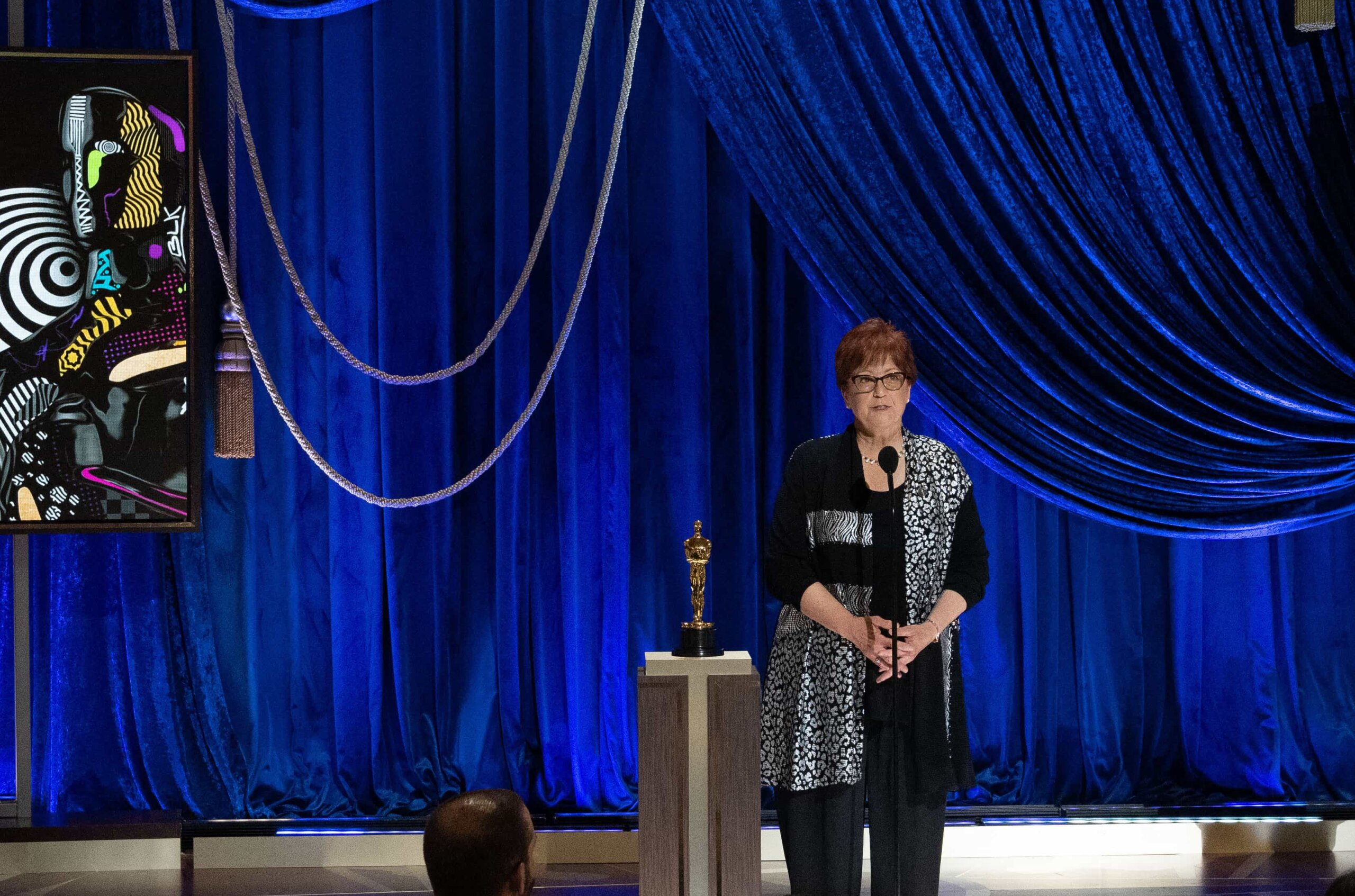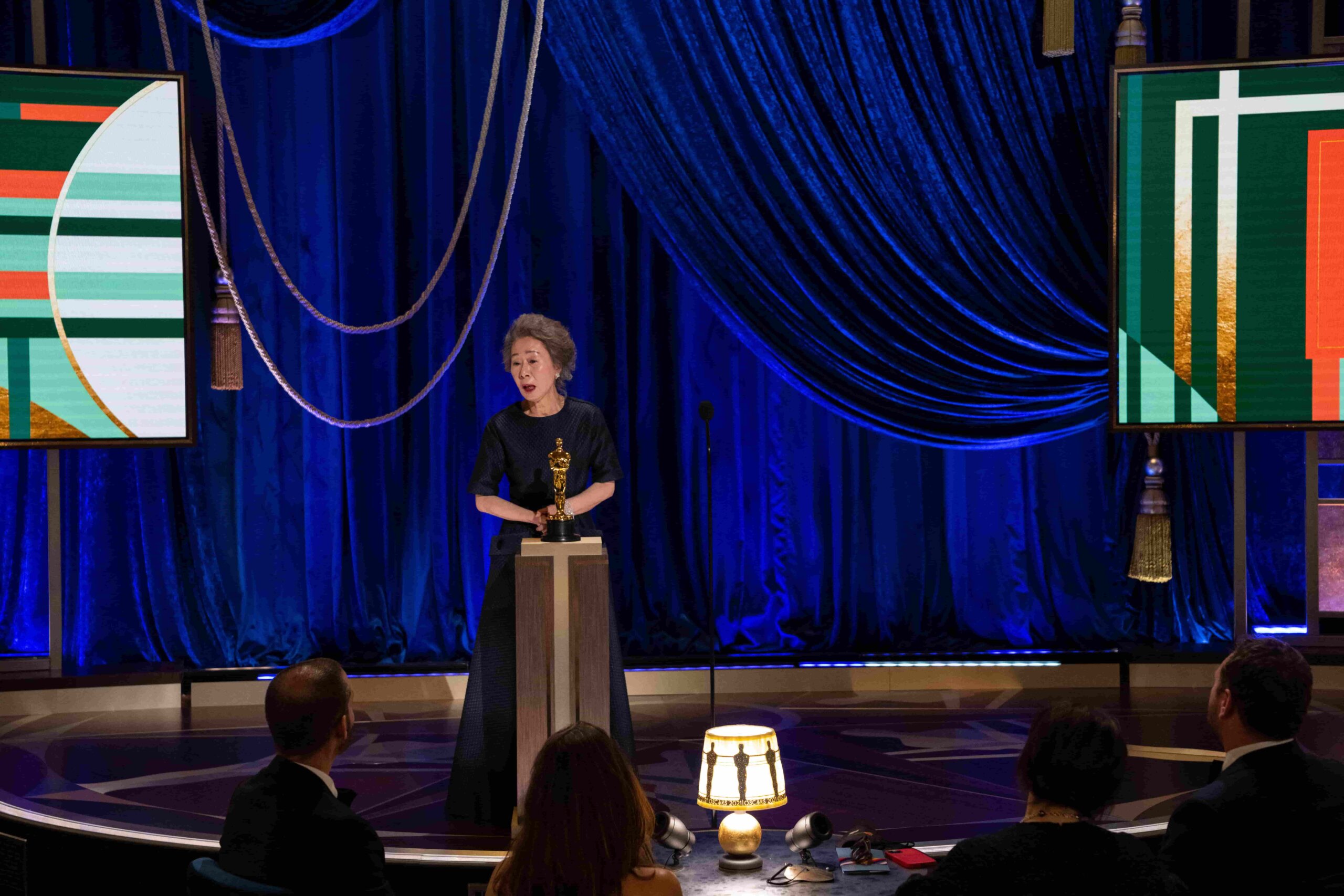A bizarre ending, and film icon Glenn Close dancing to “Da Butt.”
That’s what the 2021 Academy Awards will likely be remembered for. Sunday night’s telecast of the biggest night of the year in film was full of ups and downs, from Chloé Zhao’s historic wins for best director and best picture for Nomadland to My Octopus Teacher somehow being the best documentary of the year.
With attendees of the physical ceremony in Los Angeles requiring multiple COVID-19 tests, and with distancing requirements in place, it was the closest to a “normal” awards show we’ve had since the start of the COVID-19 pandemic. But the feat of pulling off a pandemic Oscars will likely be most remembered for the broadcast’s bizarre truncated ending, which saw an absent Anthony Hopkins unceremoniously take home best actor honours despite overwhelming predictions—and a production schedule—that suggested the award would go to the late Chadwick Boseman.
Amidst all of the drama, there was decidedly little queer content. While we had not one but two biopics of famous queer women nominated—Ma Rainey’s Black Bottom and The United States Vs. Billie Holiday—there wasn’t a single openly LGBTQ2S+ person amongst the acting categories’ 24 nominees, and the best documentary of the year—Disclosure, which focused on trans people in media—was shut out of nominations.
Still, as a male co-star of the great Laura Dern once said: “Life finds a way.” So, too, do queer takes on the Academy Awards. With that in mind, allow me to present the best queer moments of the 2021 Academy Awards.
Straight nonsense we will tolerate
First of all, I must open by noting that amongst the very straight 2021 Oscars, there was some notably heterosexual content that we will tolerate. Namely, best supporting actor-winner Daniel Kaluuya discussing his parents having sex, and his mother’s adorable reaction.
In a similar vein, best actor nominee Riz Ahmed and his wife Fatima were very straight, but very adorable on the red carpet…
This is acceptable, particularly because of their adorable meet-cute and the fact that Riz apparently proposed using a Scrabble board, which is definitely something a lesbian would do.
I guess the straights can have some rights.
Gowns, beautiful gowns
Thankfully, the Oscars never fails to disappoint when it comes to stunning looks. Aretha Franklin said it best: We do love some gowns, beautiful gowns.
Presenter and nominee Regina King came prepared to murder me personally with those strong shoulders in custom Louis Vuitton that apparently took over 140 hours to make. Opening the show—which was host-less for the third year in a row—and presenting the first award was a big task, and she understood the assignment.
Promising Young Woman actor and Disclosure executive producer Laverne Cox did not play around in custom Christian Siriano.
And speaking of Siriano, he also dressed my personal favourite Oscars look, a tiny greyhound name Tika with two gay dads. (Seriously, she’s an icon.)
While the gowns often garner the most Oscars fashion talk, the men in particular turned it up this year: Best supporting actor nominee Lakeith Stanfield was awe-inducing in a custom Saint Laurent by Anthony Vaccarello.
And Ma Rainey’s Black Bottom actor Colman Domingo brought the house down in a stunning pink custom Versace suit.
The night’s resident music maestro Questlove even wore golden Crocs on the red carpet, which need to be a thing in queer culture NOW.
Moment of the night
In a year with a comedian host, we might’ve expected to see an opening monologue with jokes about the year in film and maybe even a reference to Saiorse Ronan sitting on Kate Winslet’s face.
But the 2021 Oscars were largely devoid of cutesy bits or jokes. The whole three-and-a-half hour show was mostly earnest, full of love of the movies and the enduring human spirit in what has been an objectively rough year.
The one break from that serious earnestness came in the night’s third hour, when comedian Lil Rel Howery took to the audience of stars for a bit of stilted “name that tune.” It was no Ellen Degeneres ordering pizza, but for the first few minutes seemed fun, if a tad cheesy.
Then came Glenn Close.
When Howery approached Close with the game—hear a song, guess if it won, was nominated or was snubbed for the Oscar—everything seemed fine. Then the characteristic chords of Experience Unlimited’s 1988 classic “Da Butt” started to play.
Glenn Close is Glenn Close. Looking at Glenn Close, you might think that Glenn Close should not know what “Da Butt” is. And yet, Glenn Close shouted with the truest enthusiasm “that’s Da Butt!” And better yet, she got up and danced along.
I can’t fully explain why multi-Oscar nominee Glenn Close dancing to “Da Butt” is queer culture, but it is—and Twitter fully agreed.
Sure it was probably a scripted bit. But you know what? It sparked joy on a weird night.
Close still doesn’t have an Oscar, after South Korean legend Yuh-Jung Youn rightfully took home the best supporting actress statuette Sunday night. But she still found a way to dance her way to a victory for us all.
The actual queer content

Credit: Todd Wawrychuk/AMPAS/Abacapress.com
As the telecast slogged along, I wondered if we’d get any actual shout-outs to or representation from the LGBTQ2S+ community. Earlier in the show, best makeup and hairstyling winner for Ma Rainey’s Black Bottom Mia Neal spoke of the potential for a Black trans woman to win that award one day, and we truly would love to see it.
Then, Mank won for best production design, which was uneventful to me personally until I and the rest of lesbian Twitter realized the set decoration was done by queer woman Jan Pascale.
“When I was young, I never realized that this was a career that was even a possibility. There were so many people who helped me along the way and guided me, and I’m so grateful to all of them—and especially to my wife, Louise, who inspires me everyday,” Pascale said during her acceptance speech.
We stan a wife-loving woman.
I’d also be remiss not to mention bisexual king Travon Free, who won best short film for Two Distant Strangers alongside co-director Martin Desmond Roe—and also turned out a powerful look embroidered with the names of victims of police brutality in the United States.
And, despite a history of gay- and gender-stereotyping, Tyler Perry briefly shouted out the queer community during his powerful acceptance speech for the Oscars’ Jean Hersholt Humanitarian Award.
Beyond that though, there was almost more man/octopus content than queer content during this year’s Oscars.
Here’s hoping 2022 brings us a range of movies full of queer stories and queer creators, and that award shows take some time to shout them out.
Until then, at least we have Glenn Close and “Da Butt.”


 Why you can trust Xtra
Why you can trust Xtra


